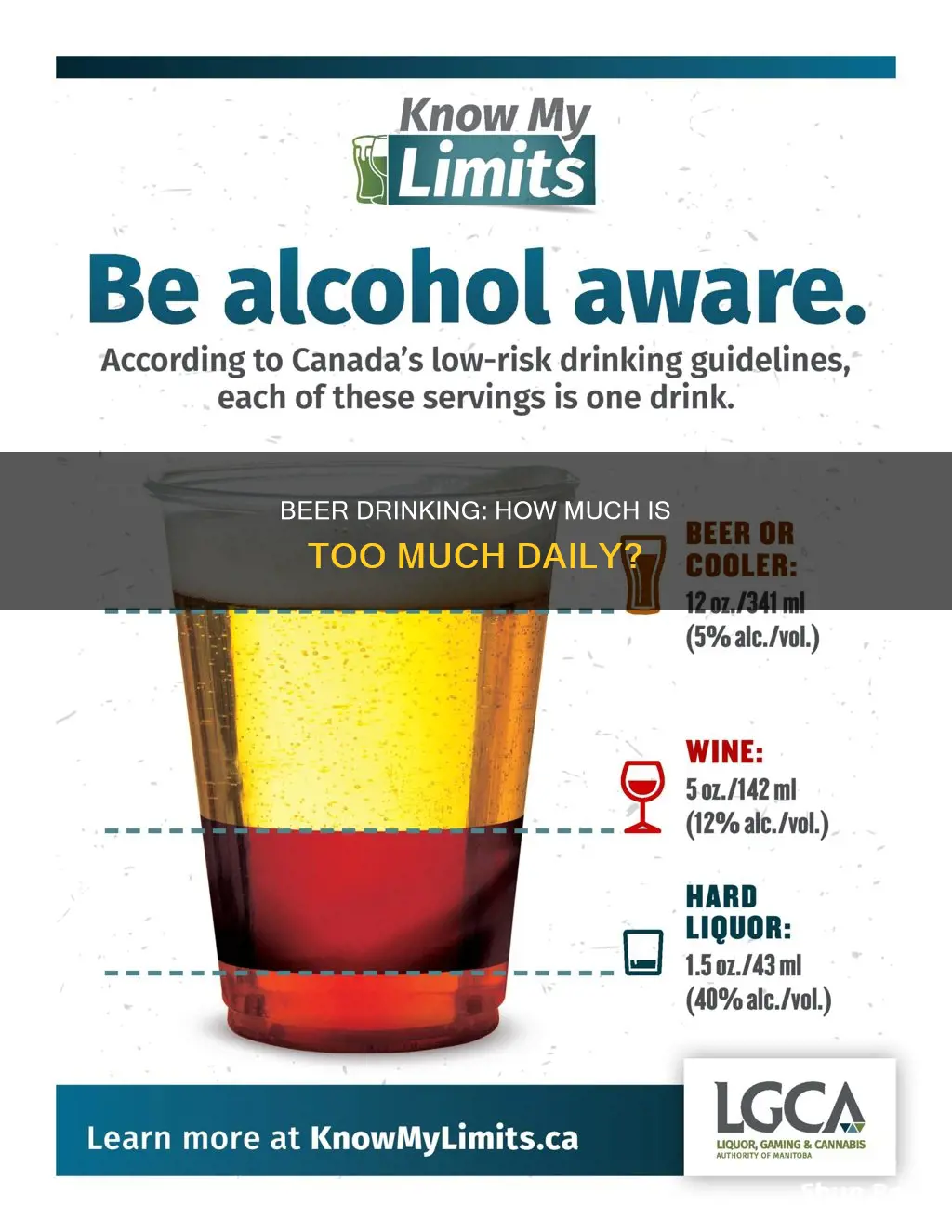
Beer is the most popular alcoholic drink in the world. It is also likely the oldest alcoholic drink in history, and its low alcohol by volume (ABV) content, which ranges from 2-6%, makes it a popular choice for light drinkers. While beer has several benefits, including being more nutritious than other alcoholic drinks, and studies suggest it can be good for the heart and may reduce the risk of stroke and heart disease, it is important to remember that too much alcohol is bad for you. According to the latest studies, the ideal amount of alcohol consumption is none at all. However, for those who do choose to drink, the general guideline for healthy adults is to limit intake to one drink or less for women and two drinks or less for men in a day. Drinking more than these amounts is considered heavy or at-risk drinking and can lead to health problems such as liver disease and alcohol use disorder.
| Characteristics | Values |
|---|---|
| Positive Effects | Improved heart health, bone density, blood sugar control, and reduced dementia risk |
| Negative Effects | Increased risk of death, alcohol dependence, depression, liver disease, weight gain, and cancers |
| Recommended Daily Intake for Women | 1 drink or less |
| Recommended Daily Intake for Men | 2 drinks or less |
| Definition of Binge Drinking for Women | 4 or more drinks within 2 hours |
| Definition of Binge Drinking for Men | 5 or more drinks within 2 hours |
What You'll Learn

Health Risks of Drinking Beer Every Day
Drinking beer every day can have several adverse effects on your health, both immediate and long-term. Here are some of the health risks associated with daily beer consumption:
Sleep Disruption
Intoxication from alcohol can affect the quality of your sleep. Even light drinking can impair sleep, with research showing that consuming two or fewer drinks for men and one or fewer for women resulted in a 9.3% decrease in sleep quality. The liver prioritises metabolising alcohol, which can lead to a restless night.
Weight Gain
When you drink beer, the liver prioritises getting rid of the alcohol toxin. This process can slow down your body's fat-burning process and hinder weight loss efforts.
Digestive Issues and Dehydration
Beer can irritate the small intestine and colon, affecting the normal speed of food movement, which may result in abdominal pain, bloating, and diarrhoea. Beer can also cause dehydration as it disrupts hormones that affect kidney function, impairing the body's ability to regulate fluids and electrolytes.
Increased Risk of Chronic Diseases
Excessive drinking increases the risk of developing various chronic diseases. These include high blood pressure, stroke, heart failure, cardiomyopathy, and certain types of cancer, such as mouth, throat, liver, and breast cancer.
Negative Impact on Mental Health
Drinking beer daily can have negative consequences for your mental health. It can lead to depression and anxiety and increase the risk of developing alcohol use disorder (AUD), characterised by an inability to control or stop drinking despite experiencing negative consequences.
Shortened Lifespan
Worldwide, alcohol misuse is the fifth-leading risk factor for disability and premature death. Excessive alcohol use can lead to a significantly shorter lifespan, with studies showing a reduction in life expectancy by as much as 24-28 years for people with AUD.
Mowing and Drinking Beer: Is it Safe?
You may want to see also

Recommended Daily Beer Intake
The recommended daily beer intake varies for men and women. According to the U.S. Dietary Guidelines, women should consume one drink or less in a day, while men should consume two drinks or less in a day. These amounts are not averages but rather a daily limit.
Drinking in moderation may offer some health benefits, such as improved heart health, better blood sugar control, stronger bones, and a reduced risk of dementia. However, heavy and binge drinking can lead to negative health consequences, including an increased risk of depression, liver disease, weight gain, cancers, and early death.
It is important to note that the potential benefits of light to moderate alcohol consumption are related to intake levels. Heavy alcohol consumption can increase the risk of heart disease and stroke. Additionally, binge drinking is defined as consuming four or more drinks for women or five or more drinks for men within about two hours. Binge drinking increases the risk of falls, car crashes, memory blackouts, medication interactions, assaults, and other harmful outcomes.
To maintain a healthy relationship with alcohol, it is crucial to stay within the recommended daily and weekly limits.
Vegan Beer: What's in Your Pint Glass?
You may want to see also

Beer and Weight Gain
Beer is an alcoholic drink made from grain, such as barley, wheat or rye, and flavoured with hops. The alcohol content of beer is usually 4–6% ABV, but it can range from 0.5% to 40% ABV. A standard 12-ounce (355-ml) serving of regular beer with 4% ABV contains 153 calories. Beer is high in carbs and alcohol but low in almost all other nutrients.
Drinking beer can cause weight gain, including belly fat. More than one beer a day or regular binge drinking raises your risk of belly fat gain and other health problems. Here are some reasons why beer may be a driver of weight gain:
- It Increases Your Calorie Intake: Gram for gram, beer contains as many calories as a soft drink. Some studies have also shown that drinking alcohol can increase your appetite in the short term, causing you to eat more than you otherwise would.
- Beer May Prevent Fat Burning: Drinking alcohol can prevent your body from burning fat. This is because your body prioritises the breakdown of alcohol over other sources of fuel, including stored fat.
- It Contains Phytoestrogens: The flowers of the hop plant, which gives beer its flavour, are known to be very high in phytoestrogens. It has been suggested that the hops in beer might cause hormonal changes in men that increase the risk of storing belly fat.
The best way to get rid of a beer belly is through diet and exercise. If you’re drinking heavily, you should also think about limiting your alcohol intake or giving it up completely. Try to avoid binge drinking, or having a lot of alcohol over one or two days.
To minimise your risk of gaining weight, make sure to keep your alcohol intake within the recommended limits and lead a healthy, active lifestyle. Moderate drinking of one beer per day (or less) is not linked with getting a “beer belly”. However, if you drink a lot of beer or binge drink regularly, then you are at a very high risk of belly fat gain, as well as various other serious health problems.
Beer and Breast Milk: Does Drinking Beer Help?
You may want to see also

Beer and Sleep Quality
While a cold beer or two can be a great way to unwind after a long day, it's important to consider the impact of alcohol on your sleep quality. Drinking beer, or any other type of alcoholic beverage, can have significant effects on your sleep, even if consumed in moderate amounts. Here's what you need to know about the relationship between beer and sleep quality:
Alcohol is a depressant, which means it can help you fall asleep faster. However, as your body works to eliminate the alcohol from your system, you may find yourself waking up throughout the night. This is because alcohol increases the production of adenosine, a sleep-inducing chemical in the brain, but this effect is short-lived. Additionally, alcohol inhibits REM sleep, which is considered the most mentally restorative phase of sleep.
Research on Alcohol and Sleep Quality
A 2018 Finnish study found that alcohol negatively impacted sleep quality, regardless of the amount consumed. The study analyzed the sleep and alcohol habits of 4,098 adults and found that low, moderate, and heavy alcohol intake reduced sleep quality by 9.3%, 24%, and nearly 40%, respectively. Interestingly, the study also showed that alcohol affected younger individuals more than older adults.
Tips for Drinking and Sleeping Responsibly
If you enjoy a beer or two in the evening, there are some tips you should follow to minimize the impact on your sleep:
- Allow a minimum of three hours between your last drink and bedtime.
- Drink water along with alcohol to help flush it out of your system.
- Consume alcohol while eating a meal, as this can help keep your drinking in check.
- Avoid alcohol if you're taking sleeping pills, as the combination can be dangerous and make it difficult to breathe while sleeping.
Beer and Sleep Apnea
It's important to note that alcohol can worsen existing sleep disorders, such as sleep apnea. If you consistently snore, experience chronic daytime exhaustion, have trouble concentrating, or wake up gasping for air, you may have sleep apnea. Alcohol can increase the frequency and duration of breathing cessations during sleep, disrupting your sleep quality and making it difficult to get the restorative sleep you need.
Heavy Beer Drinking and Health Risks
While occasional or moderate beer drinking may not be an issue for most people, heavy beer consumption can lead to serious health problems. Excessive drinking can increase the risk of unintentional injuries, violence, risky sexual behaviors, memory problems, early dementia, chronic diseases (such as liver disease and heart disease), depression, and anxiety. It can also affect your personal and professional life, leading to decreased productivity, job loss, and relationship issues.
In summary, while enjoying a beer or two may not significantly impact your sleep quality, it's important to drink responsibly and be mindful of the potential effects on your sleep and overall health.
Underage Beer Drinking: When Adults Are Present
You may want to see also

Beer and Bone Density
The relationship between alcohol consumption and bone health has been the subject of numerous studies, with conflicting results. While some research suggests that moderate alcohol intake may have beneficial effects on bone density, other studies indicate that alcohol consumption is associated with an increased risk of osteoporosis and bone loss. It is important to note that the majority of these studies are observational, and establishing a causal relationship between alcohol and bone health is challenging.
The Role of Silicon
Beer, particularly those with high levels of malted barley and hops, is a rich source of silicon, a micronutrient believed to play a role in preventing bone loss and osteoporosis. Pale ales have the highest silicon content among beers, while non-alcoholic beers, light lagers, and wheat beers contain the lowest amounts. However, it is important to consider that the health benefits of silicon in beer may diminish with higher alcohol content.
Beer Consumption and Bone Density
A clinical study found that moderate beer consumption was associated with increased bone density and strength. The study suggested that this effect was likely due to the presence of silicon in beer. However, it is important to note that excessive alcohol consumption, including beer, has been linked to bone loss and other health complications.
Gender Differences
Research has shown that the relationship between alcohol consumption and bone health may differ between men and women. A study by Tucker et al. (2009) found that men who consumed one to two drinks of beer or alcohol daily had higher bone mineral density than non-drinking men. In contrast, postmenopausal women who consumed one to two drinks per day had higher bone mineral density in the spine and hip area compared to non-drinking women. These findings suggest that the constituents of alcoholic beverages, such as silicon in beer, may contribute to bone health beyond the effects of ethanol.
Heavy Drinking and Osteoporosis
Chronic heavy drinking is consistently associated with an increased risk of osteoporosis and bone loss. Alcohol abuse can negatively impact bone health through nutrient absorption, hormone deficiencies, and the suppression of bone-building osteoblastic cells. Additionally, excessive alcohol consumption increases the risk of falls and fractures, further contributing to osteoporotic fractures.
Recommendations and Precautions
While moderate alcohol consumption may have potential benefits for bone health, it is important to stay within recommended limits. For women, moderate consumption is typically defined as up to one drink per day, while for men, it is up to two drinks per day. However, it is crucial to consult with a physician to determine safe alcohol consumption levels, especially for individuals with specific health conditions or those taking prescribed medications.
In conclusion, while some studies suggest a positive relationship between moderate beer consumption and bone density, the overall impact of alcohol on bone health is complex and influenced by various factors. Further research is needed to fully understand the role of different alcoholic beverages and their constituents in bone health.
Beer and Amlodipine: Is It Safe to Drink?
You may want to see also
Frequently asked questions
Risky drinking is defined as drinking too much, too often. For men, this means having more than four drinks on any given day. For women, it means having three drinks within the same time frame.
According to the Dietary Guidelines for Americans 2020-2025, it is recommended that men consume no more than two drinks per day and women consume no more than one drink per day.
Drinking beer every day can increase your risk of stroke, damage your heart muscle, increase your blood pressure, and has been linked to several types of cancer. Regular heavy drinking can also lead to chronic health problems such as liver disease and alcohol use disorder.







